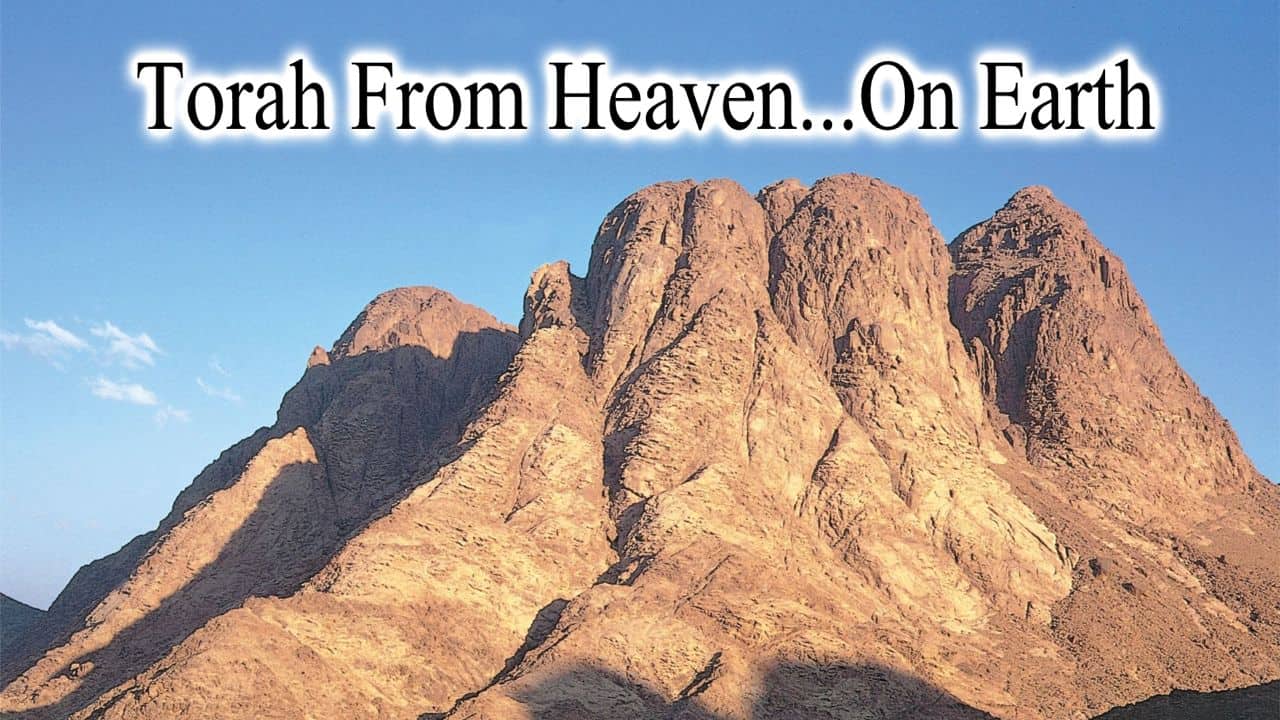Torah From Heaven…On Earth
This week’s Torah portion, Yitro, relates the events of the revelation on Mt. Sinai, at which G-d revealed and transmitted the Torah to the Jewish people. Maimonides, in his explication of the Thirteen basic fundamentals of Jewish belief, states the following:
The entire Torah was given by G-d to Moses, and the Torah that is in our hands today is the same Torah as the original. That is, the entire Torah was transmitted by G-d to Moses in a form that we call “speech” for want of a better term. And even though we do not fully understand the method of transmission, we know that Moses was like a scribe who faithfully recorded exactly what was dictated to him. There is, therefore, no difference between the verse “The sons of Ham were Cush, Mizraim, Put and Canaan,” and the verse, ““Hear O Israel: The Lord is our G-d, the Lord, is One.” They are both of Divine origin, and both are part of the complete, sacred Torah of truth. This is what the Sages meant when they said that one who says “Torah is not from heaven” has denied a basic principle of the Torah. This even includes one who claims that the entire Torah is from G-d except for one verse, which G-d did not dictate, but Moses wrote independently. Rather, every letter in the Torah bears within it wisdom and insights that are apparent to the perceptive individual. Similarly, the explanations of the Torah that were received by tradition [the Oral Law] are also from G-d. The verse that expresses this idea is that which Moses said to the Jewish people, “Through this you shall know that G-d sent me to perform all these acts, that it was not from my heart.”
Maimoinides understands that a Jew must know that the entire Torah came directly from G-d. Not one phrase, word or letter of the Torah was invented by Moses himself. Moses acted solely as the conduit through which the Torah was transmitted to the Jewish people. He reached such great spiritual heights that he was able to convey G-d’s words without the slightest change or nuance of interpretation. An important ramification of this principle is that we cannot pick and choose which parts of the Torah to accept or which commandments to fulfill. People make distinctions between parts of the Torah which involve “rituals” and “ethics,” “law” and “religion” and between commandments that govern our relationship with G-d, and those that govern our relationship with other people. The Torah itself makes no such distinctions, all the commandments are equally Divine, and we are obligated to fulfill them all to the best of our ability. To observe those parts of the Torah that we like and reject those that we do not like turns the Divine Torah into a matter of personal taste.
The Oral Law, which explains and clarifies the Written Torah, was also given by G-d to Moses. The Five Books of Moses are incomprehensible without additional explanation. Even a commandment as apparently simple as “You shall not murder” requires clarification — What is the definition of death? When does life begin? Is self-defense a justification for killing someone? Is it right to defend your property with deadly force? Some commandments are simply impossible to fulfill without additional information beyond what is found in the text. The Torah tells us, for example, to “Bind them (tefillin) as a sign upon your arm and let them be ornaments between your eyes.” What are we expected to do? Tattoo the Torah on our biceps!? What is an “ornament”?
It is a fundamental principle of our belief, that G-d did not leave us in the dark about how to fulfill the Torah. Rather, He gave us all the information that we needed, and will ever need, to observe His commandments. He also gave us the necessary rules and methodology to apply the Torah to changing times, places and circumstances. All this information is known as the Oral Torah, because it was transmitted verbally from G-d to Moses and by millions of fathers to their sons, mothers to their daughters and teachers to their students until most of it was committed to writing in about 200 CE, when Judah the Prince composed and edited the Mishnah.
In addition Maimonides states,
The Torah of Moses will never be annulled, and no other Torah will ever come from God aside from it. God will never add to or detract from it, neither in written form or orally. As the verse states, “The entire word that I command you, that you shall observe to do; you shall not add to it and you shall not subtract from it.”
We must not be influenced by every charismatic, inspiring person who claims Divine revelation. God informed us of His will on Mount Sinai once in history. Prophets were sent afterwards to reinforce our commitment to that revelation but never to change or replace it. One of the last prophets, Malachi, states the purpose of prophecy at the very end of his book, “Remember the Torah of Moses, My servant, that I commanded on Horeb to the Jewish people, its laws and statutes.” All the prophets are doing are “reminding” us of what we already have received from Moses. Any prophet, who claims to be bringing a message from God that the Torah has been changed, is contradicting the revelation at Mt. Sinai. There are those who claim that God “changed His mind,” and gave the world a new Torah, there are those who say He added to or took away parts of the Torah. We believe, however, that God Who is perfect, need not change or modify His word. Just as God does not change, so His morality and truth do not change with time and place, they are eternal and absolute.

